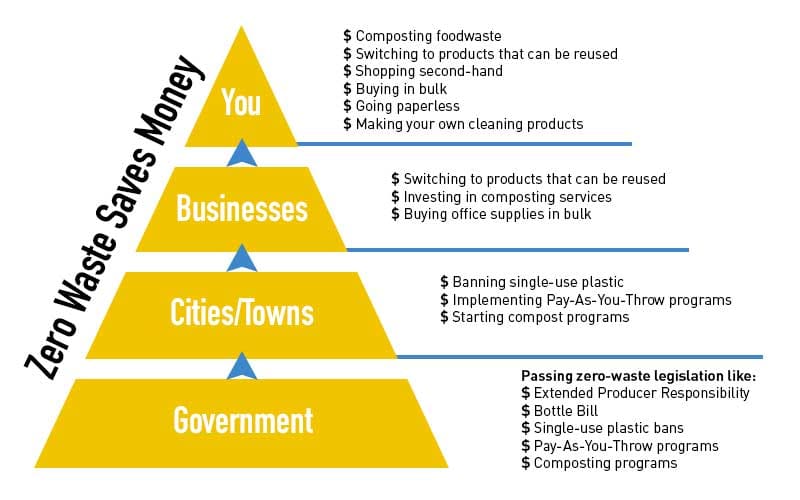
Trash is expensive. But with zero-waste practices and policies, we can keep money in the bank while also doing good for our planet. Photo: CLF
Cash, dough, bacon, moolah…no matter what you call it, the fact remains that zero-waste initiatives save money. Our zero-waste pyramid (above) shows you just some of the ways these savings kick in. Below, we break some of these policies down in more detail to show how they benefit you and your bank account.
*Note: this is not an exhaustive list of all zero-waste practices and policies that can help save money. These examples only scratch the surface.
Composting
Trash is expensive. Not only do we pay for our garbage to be picked up from the curb, but we also pay for its disposal. So, naturally, one way to save money is to reduce our trash altogether.
Food and yard clippings make up the majority of what ends up in our trash. Composting it instead can cut the amount of waste sent to landfills, as well as the price we pay for its pick-up and disposal.
Backyard composting will save you the most money, as it’s completely free (after you buy or build a compost bin). However, more and more commercial composting programs now serve homes, companies, cities and towns, and the government. These programs often include a compost pick-up fee, which will vary depending on the service itself.
Reusables
The rise of disposable single-use products not only increased our trash output but burdened our wallets. Every time we throw an item out, it means we need to buy a new one – spending more money where we don’t have to. Investing in reusable items like water bottles, grocery totes, and food containers saves you money over the long-term – and saves our environment and our neighborhoods from being burdened with more trash.
Buying in Bulk
Buying in bulk not only keeps you from purchasing the same item/s more frequently – which costs more in the long run – but it cuts down on product packaging. What’s more, if buying online, bulk orders can save on shipping costs.
Single-use Plastic Bans
When single-use items like grocery bags get tossed in a recycling bin, they contaminate what would otherwise be a load of recyclable plastic, causing the price of recycling to go up for all of us. Banning these items eliminates potential contamination, saving towns and, ultimately, taxpayers money.
Pay-As-You-Throw (PAYT)
Cities and towns with PAYT programs charge residents fees based on the amount of trash they generate – the more trash you have, the higher the cost of collection. Towns with PAYT programs, like Worcester, Massachusetts, have 40 to 50% less trash than those without – lowering trash collection costs and saving residents money.
Producer Responsibility
Producer responsibility laws require manufacturers to pay for the recycling, reuse, or disposal of their plastic products. By holding producers accountable for the proper discarding of their single-use products, towns, cities, and taxpayers no longer have to pay the price.
*Producer Responsibility laws can only be passed at the state or federal level.
Bottle Bill
When bottles and containers are returned to deposit sites, they are separated out from other recyclable materials right on the spot. This process, known as dual-stream recycling, saves cities and towns money, as they don’t have to pay for the bottles and containers to be sorted out from other recycled materials – like in single-stream systems.
*Bottle Bill laws can only be passed at the state or federal level.
Zero Waste
By reducing waste and saving money, you’ll have more money in your bank account, businesses can invest more in their employees, cities and towns can build healthier communities, and the government can invest funds in other pressing issues like transportation, housing, and education.



